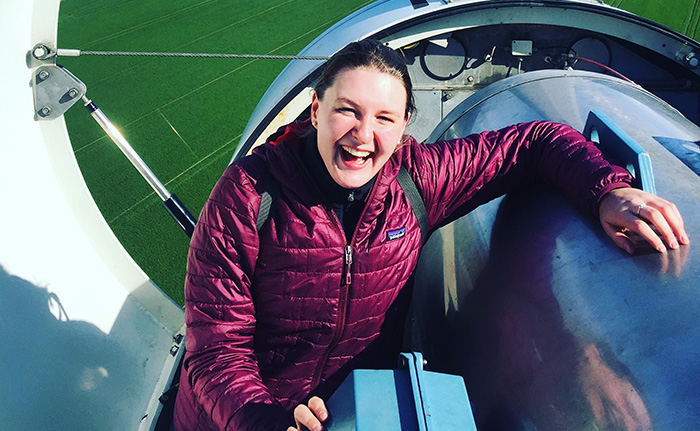Oh, the Places She'll Go!

Caroline Kanaskie ’17
Since coming to Dickinson, Caroline Kanaskie ’17 has gone far. After traveling to six states one summer with a campus water-monitoring group, she spent a semester in Copenhagen as an exchange student, and a semester in Massachusetts, conducting original research in a marine lab. This summer, she’s interning in Rhode Island through an Environmental Protection Agency (EPA) fellowship. Caroline discusses why she willingly places herself out of her comfort zone, her commitment to water quality, and her favorite way to start the day at Dickinson.
Major:
Clubs and organizations:
ALLARM, First-Year mentor, Peddler (barista).
Honors/scholarships/awards:
EPA-GRO grant, Phi Beta Kappa.
On choosing a major:
As part of a high school environmental science class, I performed water quality tests on a local stream that had been impacted by acid mine drainage. After learning about problems in our environment and seeing some of them firsthand, I knew I wanted to help provide some solutions.
Post-Dickinson plans:
I definitely want to continue my education. Ultimately, I want to help make clean water accessible to everyone, as a human right.
As a kid, I wanted to be …
… a builder and a painter. I was 2 years old when I watched my dad and two other men build the house that my family has lived in ever since. I guess that had a big impact on me! It’s not a surprise that Legos were some of my favorite toys.
On choosing Dickinson:
Toward the end of my many college visits, my mom and I decided to visit Dickinson. I was so exhausted after touring so many campuses that I almost didn’t come to Carlisle, but I was pleasantly surprised by my first experience here. It stuck out in my mind.
Favorite class/learning experience:
Working at ALLARM! I have gained so much from my experience at ALLARM—I’ve made amazing friends, seen my state in a whole new way and heard stories straight from our volunteer water-quality monitors. It provides a greater motivation for my education.
Favorite way to start the day:
Volunteering as a barista at the Peddler. I love the conversations I have with our customers—students, professors, visitors and staff. To me, mornings at the Peddler are snapshots of the Dickinson community that I never want to forget.
On studying abroad:
I participated in the Semester in Environmental Science (SES) at the Marine Biological Laboratory in Woods Hole, Mass., last fall, and then went overseas to Copenhagen, Denmark, for the spring semester. Both were great, challenging experiences in their own ways. When I willingly removed myself from my comfort zone, I found that I was able to grow more and gain a more complete perspective of myself and the world.
Little-known talent:
I grew up performing and competing as an Irish dancer.
About my internships:
Last summer, I interned at the Smithsonian Environmental Research Center in Maryland, where I was involved with several citizen-science projects. I really liked being able to apply what I learned from working at ALLARM to a whole new environment—I knew next to nothing about coastal ecosystems at the beginning of that summer. This summer, I am interning and researching at the EPA’s Atlantic Ecology Division laboratory in Narragansett, R.I. [through an EPA-GRO grant]. My research will involve nitrogen, climate change and coastal wetlands. I am looking forward to learning more about wetlands, as they are a hot topic in the world of environmental science. Wetlands do so much.
About my research:
At the Marine Biological Laboratory [Woods Hole, Mass.], I conducted my first research project on desert algae and its response to the availability of different nutrients and vitamins. I used this experience to dig deeper into a topic that initially interested me—I didn’t even know that algae grew in the desert! I also grew more comfortable in the lab.
At the EPA’s Atlantic Ecology Division laboratory in Narragansett, R.I., I’m researching nitrogen, climate change, and coastal wetlands. I am looking forward to learning more about wetlands. They are a really important part of the earth, as they store carbon and help stop erosion, among other things.
In a perfect world …
… everyone has access to clean water.
Learn more
- “GROwing by Leaps and Bounds”
- “Water Works”
- “On Watch”
- Department of Environmental Studies & Environmental Science
- Interns in Action
- More Student Snapshots
- Latest News
Published November 22, 2016